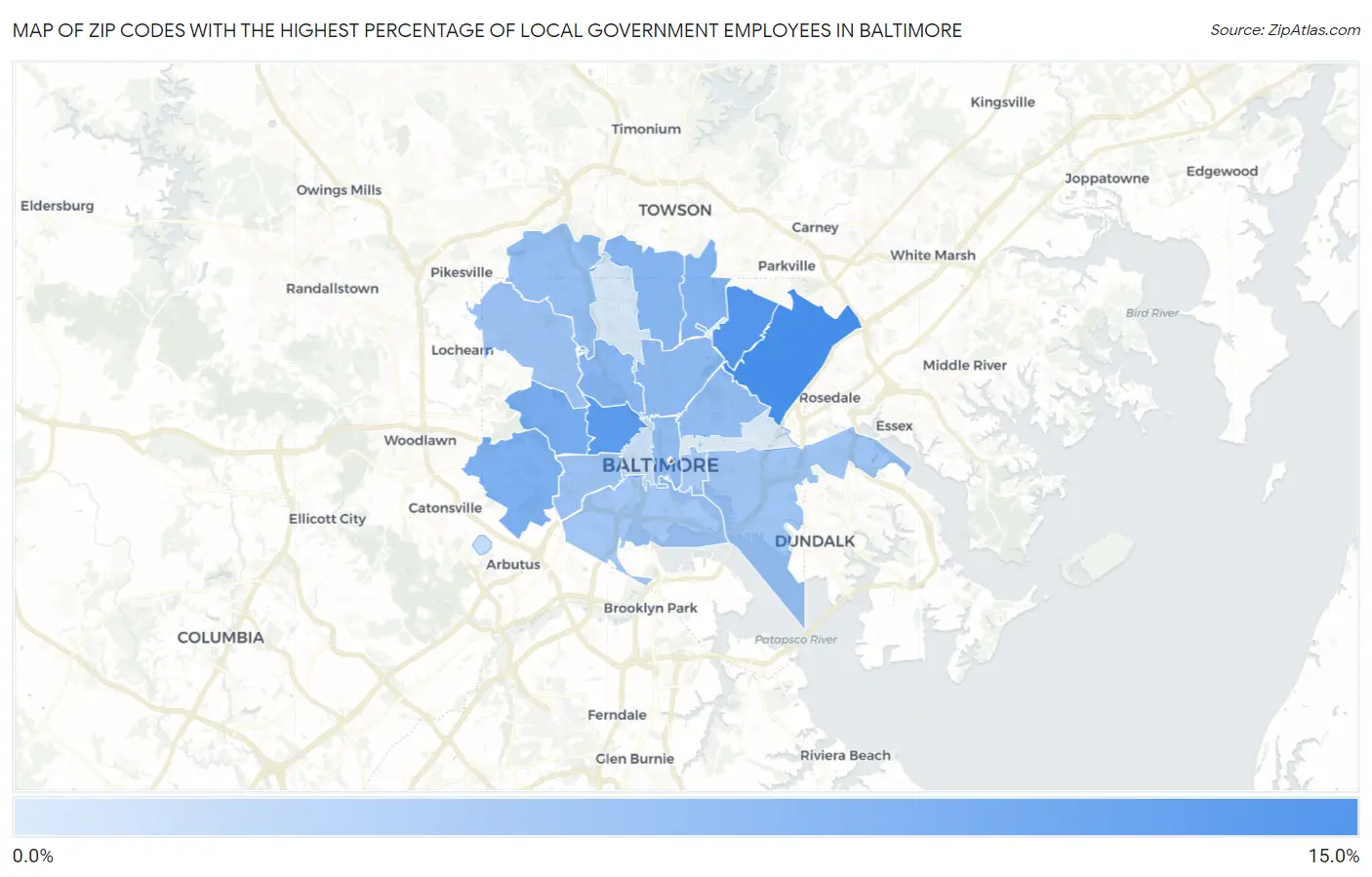Zip Codes with the Highest Percentage of Local Government Employees in Baltimore, MD
RELATED REPORTS & OPTIONS
Local Government Employees
Baltimore
Compare Zip Codes
Map of Zip Codes with the Highest Percentage of Local Government Employees in Baltimore
0.0%
15.0%

Zip Codes with the Highest Percentage of Local Government Employees in Baltimore, MD
| Zip Code | % Local Government Employees | vs State | vs National | |
| 1. | 21206 | 11.1% | 7.4%(+3.73)#86 | 7.2%(+3.88)#6,457 |
| 2. | 21214 | 10.3% | 7.4%(+2.91)#107 | 7.2%(+3.06)#7,807 |
| 3. | 21217 | 10.0% | 7.4%(+2.66)#113 | 7.2%(+2.82)#8,231 |
| 4. | 21216 | 8.2% | 7.4%(+0.835)#194 | 7.2%(+0.991)#12,567 |
| 5. | 21229 | 7.9% | 7.4%(+0.498)#205 | 7.2%(+0.654)#13,541 |
| 6. | 21239 | 7.5% | 7.4%(+0.102)#226 | 7.2%(+0.258)#14,810 |
| 7. | 21212 | 7.3% | 7.4%(-0.064)#238 | 7.2%(+0.093)#15,326 |
| 8. | 21211 | 7.1% | 7.4%(-0.285)#254 | 7.2%(-0.129)#16,025 |
| 9. | 21218 | 6.9% | 7.4%(-0.446)#267 | 7.2%(-0.290)#16,575 |
| 10. | 21202 | 6.6% | 7.4%(-0.784)#286 | 7.2%(-0.628)#17,766 |
| 11. | 21213 | 6.6% | 7.4%(-0.811)#287 | 7.2%(-0.655)#17,857 |
| 12. | 21209 | 6.3% | 7.4%(-1.08)#301 | 7.2%(-0.925)#18,783 |
| 13. | 21215 | 6.3% | 7.4%(-1.13)#303 | 7.2%(-0.977)#18,937 |
| 14. | 21223 | 6.2% | 7.4%(-1.18)#306 | 7.2%(-1.02)#19,115 |
| 15. | 21224 | 5.9% | 7.4%(-1.48)#316 | 7.2%(-1.32)#20,102 |
| 16. | 21230 | 5.7% | 7.4%(-1.70)#324 | 7.2%(-1.55)#20,874 |
| 17. | 21231 | 5.4% | 7.4%(-2.03)#336 | 7.2%(-1.88)#21,964 |
| 18. | 21250 | 3.7% | 7.4%(-3.73)#387 | 7.2%(-3.57)#26,426 |
| 19. | 21201 | 3.6% | 7.4%(-3.77)#388 | 7.2%(-3.61)#26,500 |
| 20. | 21210 | 2.8% | 7.4%(-4.58)#402 | 7.2%(-4.42)#27,826 |
| 21. | 21205 | 2.4% | 7.4%(-4.95)#406 | 7.2%(-4.80)#28,276 |
1
Common Questions
What are the Top 10 Zip Codes with the Highest Percentage of Local Government Employees in Baltimore, MD?
Top 10 Zip Codes with the Highest Percentage of Local Government Employees in Baltimore, MD are:
What zip code has the Highest Percentage of Local Government Employees in Baltimore, MD?
21206 has the Highest Percentage of Local Government Employees in Baltimore, MD with 11.1%.
What is the Percentage of Local Government Employees in Baltimore, MD?
Percentage of Local Government Employees in Baltimore is 7.3%.
What is the Percentage of Local Government Employees in Maryland?
Percentage of Local Government Employees in Maryland is 7.4%.
What is the Percentage of Local Government Employees in the United States?
Percentage of Local Government Employees in the United States is 7.2%.